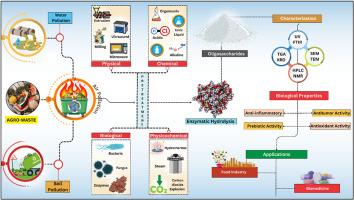A review on the preparation, characterization, and applications of agro-waste-derived oligosaccharides
IF 4.8
1区 农林科学
Q1 FOOD SCIENCE & TECHNOLOGY
引用次数: 0
Abstract
Agro-waste is a significant global environmental hazard. Thus, the primary focus for achieving environmental sustainability is agro-waste usage. Efforts have been made to utilize lignocellulosic agro-waste as a source of biofuels for energy production. However, this biomass can also be utilized to manufacture prebiotic oligosaccharides. Oligosaccharides are little chains of monosaccharides, typically consisting of two to ten units of simple sugars. They are not broken down by human digestive enzymes and instead are metabolized by bacteria in the colon. These are extremely stable and are utilized as a dietary supplement with antioxidant, prebiotic and possible immune-modulating characteristics. The demand for innovative prebiotic compounds with enhanced functional qualities is experiencing a significant increase in the food, nutraceutical, pharmaceutical and cosmetic industries. Thus, this review provides an overview of several prebiotic sources, pretreatment techniques, preparation processes, production methods and applications. Furthermore, it investigates the wide array of applications for oligosaccharides obtained from agricultural waste. Thus, agro-waste can be converted into prebiotic oligosaccharides, simultaneously tackling environmental concerns and offering health advantages.

农业废弃物衍生低聚糖的制备、表征和应用综述
农业废弃物对全球环境造成严重危害。因此,实现环境可持续性的首要重点是农业废弃物的利用。人们一直在努力利用木质纤维素农业废弃物作为生物燃料来源来生产能源。然而,这种生物质也可以用来生产益生寡糖。低聚糖是单糖的小链,通常由 2 到 10 个单位的单糖组成。它们不会被人体消化酶分解,而是被结肠中的细菌代谢掉。它们非常稳定,可用作膳食补充剂,具有抗氧化、益生和可能的免疫调节特性。食品、保健品、药品和化妆品行业对具有增强功能性的创新型益生元化合物的需求正在显著增加。因此,本综述概述了几种益生元来源、预处理技术、制备工艺、生产方法和应用。此外,它还研究了从农业废弃物中获得的低聚糖的广泛应用。因此,农业废弃物可转化为益生元低聚糖,同时解决环境问题并提供健康优势。
本文章由计算机程序翻译,如有差异,请以英文原文为准。
求助全文
约1分钟内获得全文
求助全文
来源期刊

Food Bioscience
Biochemistry, Genetics and Molecular Biology-Biochemistry
CiteScore
6.40
自引率
5.80%
发文量
671
审稿时长
27 days
期刊介绍:
Food Bioscience is a peer-reviewed journal that aims to provide a forum for recent developments in the field of bio-related food research. The journal focuses on both fundamental and applied research worldwide, with special attention to ethnic and cultural aspects of food bioresearch.
 求助内容:
求助内容: 应助结果提醒方式:
应助结果提醒方式:


